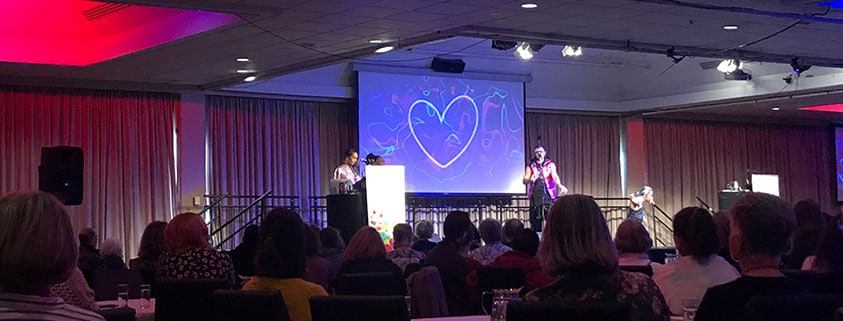THINK BIGGER; FIX EVERYTHING
– No pressure!
Our group thoroughly enjoyed the conference. Perhaps because it’s been a long while since we’ve all had the opportunity to get out amongst likeminded humans looking for inspiration, creative solutions and a reminder that regardless of whether the glass is half full or half empty, there is always room for improvement, growth and new awakenings. The first morning started with a motivating performance by Mitch Tambo which set the tone for the rest of the day. Uncle Jack Charles followed with an endearing and entertaining presentation.
Other speakers included:
- Robert Fitzgerald (NSW Ageing and Disability Commissioner)
- Dr Helena Popovic; a leading authority on improving brain function, whose very scary ‘get of bed early jumping with joy and enthusiasm’ attitude has actually resulted in Lucy undertaking a 20 second run on the spot routine during her day … It’s backed by science!
- Hugh Mackay (social psychologist and author) on The Kindness Revolution
- Dr Ramona Vijeyarasa (international law and human rights activist)
- Jess Hill (investigative journalist)
- Grace Tame (Australian of the year and advocate for survivors of sexual assault)
- Dr Tim Thornton (political economist)
- Daniel Teitelbaum (Playful Thinking)
- Hani Abdile (writer, student, poet, refugee)
- Andrew Wear (policy expert, author and speaker)
- Jess Scully (Deputy Lord Mayor Sydney, curator, cultural strategist and creative industries advocate),
- Chris Helder – ‘Today is the best day in the history of the world to be you!‘ – who totally changed our perception about motivational speakers; and
- Senator Penny Wong (who has far more to offer in wisdom and knowledge than time allowed for)
JESS HILL
These figures are alarming. The optimists among us might say ‘This is great, it means more people are willing to speak out.’ The glass half empty folks might say, ‘This is not good, we don’t want to see this many people experiencing violence’. If we do not stay focused and driven on addressing this issue, then it will be buried once again only to rear its ugly self in 10 years time with a host of new buzz words. Further, this is something that effects everyone; survivors of violence, victims, children, family, friends, colleagues, policy makers, perpetrators and support services. If you do not know someone who has experienced violence or is the perpetrator of violence, it’s most likely only because you haven’t been told about it. To put it into perspective, take a few seconds to think 1 in 4 the next time you are in a crowded place, be it the gym, supermarket, birthday party, restaurant or work meeting.
A shift in attitudes and perceptions is one small way we can each make a difference, if only to say to someone ‘It’s not ok’. This in conjunction with a proactive community service model might be enough to make a significant impact.






